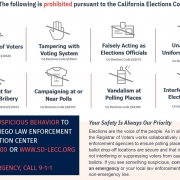Fatal DUIs Spike Amid COVID-19
San Diego County District Attorney Summer Stephan said today that over the last five months San Diego County has averaged one fatal DUI crash per week and is on target to surpass its worst record in decades. Even though non-injury DUI cases are down more than 30 percent, fatal crashes are up 33 percent with 24 deaths so far this, compared to 18 last year. In addition, blood-alcohol levels are higher than last year’s average.
The DA also announced today that her office is receiving a grant of $426,000 from the Office of Traffic Safety to prevent and prosecute impaired driving deaths. For the last seven years, cases in which someone dies at the hands of a DUI driver are investigated as potential murders, instead of approaching the case as a DUI car crash in which someone died. This higher level of investigation, prosecution and accountability is thanks to a grant from the Office of Transportation Safety, which is in its seventh year of funding the DA’s DUI Homicide Unit. To date, the organization has given more than $2.7 million in DUI grants to the DA’s Office.
“This grant will allow our DUI Homicide Unit to continue its critical public safety work,” DA Stephan said. “Even with stay-at-home orders because of the pandemic and many bars being closed, we are still on the brink of topping the highest number of deadly DUI crashes we have had in a single year. Today’s drivers know the risks and the dangers of driving under the influence of alcohol or drugs, yet they persist. Prosecuting and investigating these important cases require a specialized team of prosecutors and investigators to be able to hold offenders accountable and deter this deadly behavior.”
In addition to forming a special prosecution team, funding will be used to:
- Develop protocols for handling cases through every step of the criminal process.
- Provide training for prosecutors and investigators through California’s Traffic Safety Resource Prosecutor Program.
- Host quarterly regional meetings with law enforcement partners to improve DUI investigations and prosecutions.
“If you drink or use drugs and decide to drive, you put lives at risk,” said OTS Director Barbara Rooney. “This funding from the OTS makes sure that those who make the choice to drive under the influence are held accountable for their actions.”
More than 9,406 DUI-related cases were prosecuted last year, a slight decrease from the 9,629 in 2018, a decrease of just 2.5 %. At the same time however, the District Attorney’s Office prosecuted 445 DUI with injury or fatality cases. The worst year for fatal DUI crashes was 2017, when we had 25 deaths. This year is on track to top that sad distinction.
As part of the grant and with assistance from the State’s Traffic Safety Resource Program, the DUI Homicide Unit coordinates and participates in DUI prevention and awareness in schools, military bases and colleges. It also provides training to local law enforcement agencies. Funding from this DUI Prosecution Grant will aid the District Attorney’s Office in handling cases through each step of the criminal process. This includes prosecuting both alcohol and drug-impaired driving cases. In fatal and major injury DUI vehicle collisions, members of the team may respond to the crash scene to assist in the investigation.
The DUI Homicide Unit, which launched in 2014, streamlines complex DUI cases by creating expertise within the office. The specialized unit creates uniformity in sentencing among the four adult courthouses. In addition, the unit helps law enforcement adapt to changes in technology by having a designated DA Investigator who is trained in the latest techniques in collision reconstruction. Since its inception, the unit has prosecuted more than 130 cases.
In recent years, California has seen an increase in drug-impaired driving crashes. The District Attorney’s Office supports efforts from OTS reminding the public that “DUI Doesn’t Just Mean Booze.” If you take prescription drugs, particularly those with a driving or operating machinery warning on the label, you might be impaired enough to get a DUI. Marijuana use can also be impairing, especially in combination with alcohol or other drugs, and can result in a DUI arrest and conviction.
Grant funding from the California Office of Traffic Safety through the National Highway Traffic Safety Administration will change how our office handles these challenging cases to be better, more efficient and more effective.










